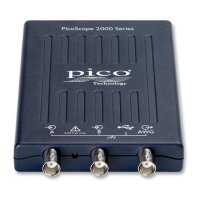handle: the handle of the required oscilloscope
times: a pointer to a buffer for the sample times in time_units.
Each time is the interval between the trigger event and the
corresponding sample. Times before the trigger event are negative,
and times after the trigger event are positive.
buffer_a, buffer_b: pointers to buffers that receive data from
the channels A and B. A pointer will not be used if the oscilloscope
is not collecting data from that channel. If a pointer is NULL,
nothing will be written to it.
buffer_c, buffer_d: not used
overflow: a bit pattern indicating whether an overflow has
occurred and, if so, on which channel. Bit 0 is the LSB. The bit
assignments are as follows:
Bit 0 - Ch A overflow
Bit 1 - Ch B overflow
time_units: can be one of the following:
PS2000_FS (0), femtoseconds,
PS2000_PS (1), picoseconds,
PS2000_NS (2), nanoseconds [default]
PS2000_US (3), microseconds,
PS2000_MS (4), milliseconds,
PS2000_S (5), seconds
no_of_values: the number of data points to return. In streaming
mode, this is the maximum number of values to return.
The actual number of data values per channel returned, which may
be less than no_of_values if streaming
0: if one or more of the parameters are out of range, if the times
will overflow with the time_units requested (use
ps2000_get_timebase to acquire the most suitable time_units) or if
the oscilloscope is in streaming mode

